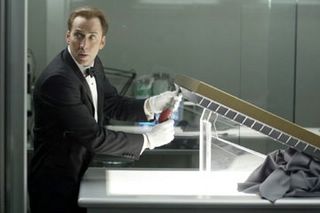National Treasure
So, I've started posting some of my reviews over on the Laser Blazer website. You can see how the prototype of the review page looks right here. And every week, the boss wants to throw up a review or two of the New Releases.
It's all very flattering, but it does mean that I have to write at least one positive review of a new DVD every week. I mean, posting reviews in which I rip apart new movies won't exactly move units, you understand?
But don't worry...I refuse to compromise my strict blog code of ethics by positively reviewing any film that I genuinely dislike. I may just have to watch, like, 10 new releases every week until I see something I like.
So, anyway, I predict this review won't be going on any other website any time soon. Because National Treasure is a joke, an adventure with no sense of adventure, a comedy without laughs, a thriller that's never exciting and an action vehicle that never once kicks into overdrive.
You can see uber-producer Jerry Bruckheimer's fingerprints all over the film. It's directed by Jon Turteltaub, the man responsible for the lazy Phenomenon, the abysmal Instinct, the treacly Three Ninjas and the astoundingly not-so-bad Cool Runnings.
Those films are all anonymously directed; Turteltaub obviously don't care much for personalizing his films, and prefers to make a living a directorial journeyman. So this winds up feeling like a generic Bruckheimer-ian vehicle - it's cut very quickly, giving it a hyperkinectic feel; it's extremely formulaic; there's a glossy, professional shean to all the cinematography; it stars Nicholas Cage in his I've-just-taken-horse-tranquilizers laconic mode.
But the real bane of contemporary Bruckheimer, the problem that's evident in all of his films, really comes to fruition in National Treasure. Bruckheimer mistakes satisfying his audience with overloading them. Rather than make tightly-wound, taut and exciting 90 minute movies, he makes bloated, overdone, repetitive juggernauts like Armageddon, Con Air and Enemy of the State. Even Pirates of the Carribean, which I rather enjoyed, wears out its welcome at around the 110 minute point.
On one level, you do have to respect Bruckheimer's ambition. He's not some huckster, selling you on his movies by making false promises about enormous spectacle. He doesn't just say he's making the biggest movie of the year...he's really trying to do it, to out-spectacle everyone else in Hollywood.
It's just that these movies don't need to go on to such epic lengths. They're not epics at all! They are, at heart, simple, straightforward entertainments. We get the idea early on, and the fun is in how the filmmakers can realize these outrageous, high-concept visions. But in films like Bad Boys 2, we're asked to slog through an endless string of set-pieces, constantly encountering new foes that must be gunned down, or new puzzles that must be solved.
It's in the non-stop discovery of new riddles that National Treasure began to wear on my patience. The film is essentially a knock-off of the best selling novel "Da Vinci Code," replacing the book's art history angle with an American history motif. Obsessive treasure hunter Ben Gates (Cage) and his team have stumbled on an old pipe, a pipe that provides a vital clue to finding the largest treasure in the history of, like, forever.
The Freemasons, under the guidance of Ben Franklin and George Washington, you see, buried this treasure somewhere in America, because they felt it was too much money for any human being to handle. And Ben's family, from his grandfather on down, have been obsessed with finding the stash.
The only problem is, this pipe clue? It leads to a map that's located on the back of the Declaration of Independence. So now Ben, in competition with other treasure hunters led by the evil Ian (Sean Bean) have to steal the Declaration, follow the clues and find the treasure while evading the FBI (led by Harvey Keitel, playing his Wolf character from Pulp Fiction) and a beautiful National Archives employee (Diane Kruger, who played Helen of Troy in Troy)
Stopped caring yet? Well, that's just the first half hour! After the Declaration's stolen, they've got to spirit it all around Washington, decode it (using lemon juice!) with assistance from Ben's curmudgeonly father (Jon Voight), then follow another set of clues leading to the Liberty Bell in Philadelphia, and then to Manhattan and...well, you get the idea.
The problem isn't the material, per se. I mean, it's bafflingly ridiculous, an insult to your intelligence that screenwriters Jim Kouf, Cormac Wibberley and Marianne Wibberley expect you to swallow some of the logical jumps here. But it could be pulled off. The problem is how long the film goes on, and how dry the proceedings get.
This is a movie that should be zippy, fun and quick. I mean, absolutely no more than 90 minutes. If this story were made during Hollywood's Golden Era, it might have starred Errol Flynn or Cary Grant, and it might have been just as silly, but it definitely wouldn't be longer than 2 and a half hours with a cartoon short, a newsreel and the latest episode of some serial adventure. And it would cost a nickel, dammit!
Why make it into an interminable slog? In the story, Ben's father, the Jon Voight character, has grown weary of the endless quest for the treasure, and has given up on the dream. He tells his son (repeatedly, of course) that there is no treasure, that the Masons invented the quest to occupy and distract treasure seekers, and that the riddles will go on forever. By the end of the film, I was ready to agree with him.

1 comment:
You're not very nice. I thought the movie was wonderful, and it has some very correct historical stuff in it
Post a Comment